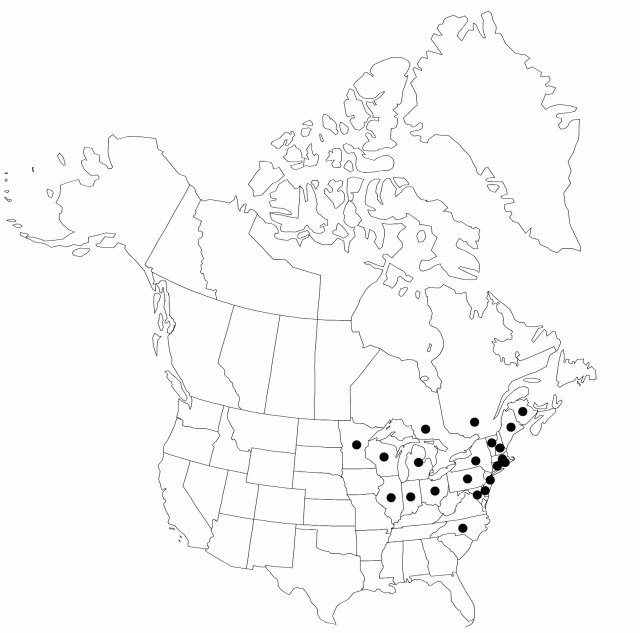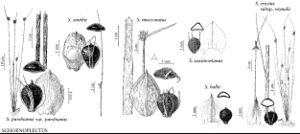Schoenoplectus smithii
Cas. Nár. Mus., Odd. Prír. 141: 62. 1972.
Plants annual; rhizomes 1 mm diam. Culms often arching (to decumbent), terete, 0.02–0.5 m × 0.5–1.5 mm. Leaves 1, to equaling culm; sheath fronts not pinnate-fimbrillose; blades 0–1, cross-section C-shaped, from a mucro to longer than a sheath by 0.5 mm, smooth. Inflorescences capitate or 1 spikelet; proximal bract erect, very rarely divergent, on longer culms of plants 5–150 mm and 1/5–2/3 culm length. Spikelets 1–15, 5–12 × 3 (–4) mm; scales straw-colored to orangebrown, often lineolate-spotted, midrib region usually green becoming straw-colored, obovate, 2.5–3 × 1.5–2 mm, smooth, margins distally ciliolate at 20X, flanks in proximal part of spikelet each with 2–10 distinct ribs, apex rounded, entire, mucronate. Flowers: perianth bristles 0 or 4–6, rarely 1–3, brown, ± equaling to 2 times longer than achene, rarely much shorter, slender throughout, densely to sparsely retrorsely-spreading spinulose; anthers 0.4–0.6 mm; styles 2-fid or 2-fid and 3-fid. Achenes brown, turning blackish, thinly to thickly planoconvex or unequally biconvex, sometimes clearly trigonous with distinct, narrow abaxial angle, adaxial face without central bulge, cuneate-obovoid, proximally evenly tapered and usually without stipelike constriction, 1.5–2 × 1.2–1.5 mm, base 0.2–0.3 mm wide; beak 0.1–0.2 mm, very finely longitudinally ridged at 20–30X.
Distribution

N.B., Ont., Que., Conn., Del., Ill., Ind., Maine, Mass., Md., Mich., Minn., N.C., N.H., N.J., N.Y., Ohio, Pa., R.I., Va., Vt., Wis.
Discussion
Varieties 3 (3 in the flora).
Plants of Schoenoplectus smithii with perianth bristles are easily disinguished from S. purshianus by the uniformly slender bristles in S. smithii; plants without bristles may be identified using the achene characters as indicated in the key. In addition, in S. smithii the receptacle collar is relatively small, the achenes are usually widest distal to the middle, the summit is often subtruncate, the adaxial face is often plane, the abaxial face is without a central bulge and sometimes has a distinct narrow angle, and when mature the surface has fine longitudinal ridges. In contrast, in S. purshianus the receptacle collar is relatively large, the achenes are usually widest at the middle, the summit is usually rounded, the adaxial face is nearly always convex, the abaxial face has a distinct central bulge and never a narrow angle, and the surface lacks fine longitudinal ridges.
The eastern Asian Scirpus komarovii Roshevitz [= Schoenoplectus komarovii (Roshevitz) Soják] was treated as Scirpus smithii var. leiocarpus (Komarov) T. Koyama (= Schoenoplectus smithii subsp. leiocarpus Soják) by T. Koyama (1962b); it is better to treat S. komarovii as a distinct Asian species and S. smithii as restricted to North America pending further research (S. G. Smith and E. Hayasaka 2002).
The varieties of Scirpus smithii were reduced to S. smithii forma setosus (Fernald) Fernald and S. smithii A. Gray forma levisetus (Fassett) Fernald (M. L. Fernald 1942). It seems better to treat those taxa as ecotypic varieties following W. R. Ferren Jr. and A. E. Schuyler (1980) because they reportedly grow in different habitats (S. G. Smith and E. Hayasaka 2002) and thus may be valuable as ecologic indicators. The varieties are undoubtedly more widely distributed than given here; distributions were based on specimens I have seen and reports by A. E. Schuyler (1972) and W. R. Ferren Jr. and A. E. Schuyler (1980).
Selected References
None.
Lower Taxa
Key
| 1 | Perianth bristles absent or rudimentary. | Schoenoplectus smithii var. smithii |
| 1 | Perianth bristles present, some well developed. | > 2 |
| 2 | Perianth bristles 4–6, equaling to twice as long as achene, densely spinulose. | Schoenoplectus smithii var. setosus |
| 2 | Perianth bristles 1–4, much shorter than to nearly equaling achene, smooth or very sparsely spinulose. | Schoenoplectus smithii var. levisetus |
"shortened" is not a number."prolonged" is not a number.
